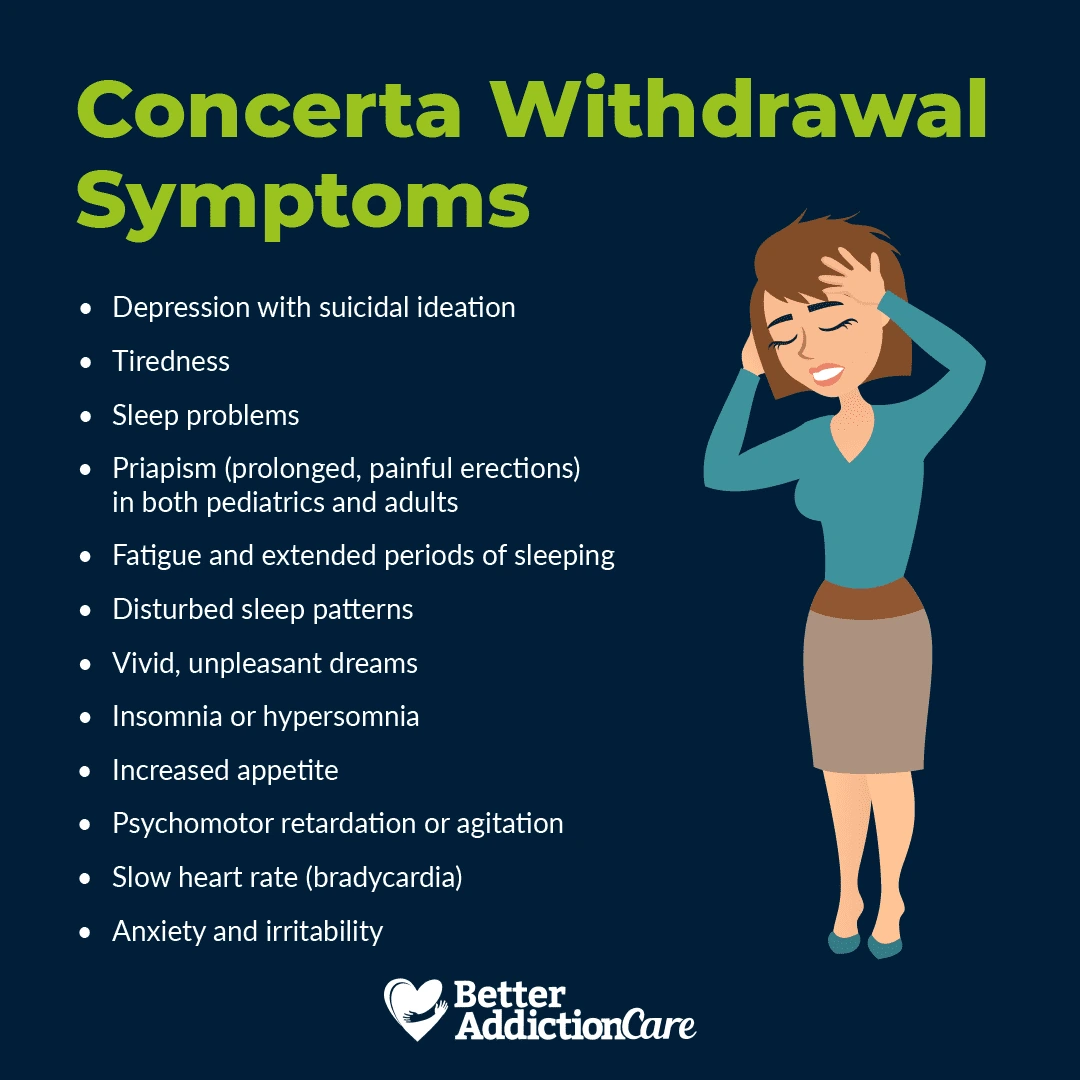Concerta Withdrawal and Detox
Concerta (methylphenidate) is a prescription central nervous system (CNS) stimulant used to treat attention-deficit/hyperactivity disorder (ADHD) in people between the ages of 6 and 65. However, many people misuse Concerta for its desirable effects like euphoria, increased energy, and enhanced concentration.

Chronic Concerta use or abuse can lead to physiological dependence, which means you need to take Concerta to avoid unpleasant withdrawal symptoms. If you are taking Concerta medically and want to quit safely, talk to your doctor, they will create a tapering schedule to gradually wean you off of it. But if you misuse Concerta or have a Concerta addiction, you will want to find a professional detox program to help you withdraw safely and comfortably.
What Causes Concerta Withdrawal?
Concerta withdrawal is caused by physical dependence on the drug, which develops when the brain adapts to its presence and struggles to function normally without it
While Concerta is a non-amphetamine psychostimulant, its effects are similar to those of amphetamines and cocaine. Concerta increases the concentration of two primary neurotransmitters: dopamine and norepinephrine.
Dopamine produces feelings of pleasure and euphoria and is involved in the brain’s reward pathway, which makes Concerta particularly prone to misuse. The increase in dopamine caused by Concerta addiction creates a much more rewarding feeling than natural activities like sex or eating. This motivates continued Concerta misuse and ultimately contributes to the progression from misuse to Concerta addiction.
Long-term Concerta misuse or abuse can cause changes in the brain function and structure, particularly to the dopamine receptors. These changes cause a dependence on Concerta, which means you need to use Concerta to function optimally and to stave off withdrawal symptoms. Without Concerta, your dopamine levels will drop considerably, which leads to Concerta withdrawal symptoms, such as depression.
What are the Symptoms of Concerta Withdrawal?
The main symptoms of Concerta withdrawal include fatigue, increased appetite, depression, vivid dreams, and sleep disturbances like insomnia or hypersomnia.
Listed below are 11 Acute withdrawal symptoms commonly associated with Concerta.
- Severe depression
- Anhedonia (inability to feel pleasure)
- Severe cravings
- Fatigue
- Sleep problems
- Vivid, unpleasant dreams
- Insomnia or hypersomnia
- Increased appetite
- Psychomotor retardation or agitation
- Slow heart rate (bradycardia)
- Anxiety and irritability

What is the Concerta Withdrawal Timeline?
Concerta withdrawal timeline starts with a few hours up to 7 days. Because Concerta is an extended-release formulation of methylphenidate, its effects are long-acting and it takes longer for the stimulant to leave your system. As such, your Concerta withdrawal symptoms may take longer to emerge than if you were taking a short-acting version of methylphenidate, like Ritalin. However, if you are misusing Concerta by opening the capsule and snorting the powder, you will have a more rapid onset of effects and that means your withdrawal symptoms will emerge sooner.
Extended-release Concerta is designed to be effective at therapeutic levels for 12 hours. Exactly how long it takes to completely exit your system and for you to feel withdrawal symptoms depends on several factors, including:
- Your body weight
- The dosage of Concerta you are currently taking
- The route of medication delivery (tablet, intravenous, intranasal)
- Other medications you are taking along with Concerta
- Other chronic medical conditions you are managing
To date, most of the research on stimulant withdrawal timelines is focused on amphetamine drugs. While Concerta is a stimulant like amphetamines, research has been limited to case studies. Below is a typical amphetamine withdrawal timeline, which Concerta may follow:
- Withdrawal symptoms emerge within 12 hours after last use
- Symptoms peak within 3-7 days after discontinuation
- Most symptoms resolve within 7 days, although some people have reported symptoms for up to 3 weeks
Your liver naturally filters out toxic substances, but that process takes time. The half-life of Concerta is 3.5 hours, which means it may take up to 24 hours to fully clear from your system. Clearance time may be further increased in cases of liver damage.
What are the post-acute Withdrawal Symptoms?
Post-acute withdrawal symptoms are primarily psychological and include anxiety, depression, irritability, sleep disturbances, fatigue, mood swings, and difficulty concentrating.
Although acute Concerta withdrawal resolves within a week or two, some post-acute withdrawal symptoms may linger for weeks or even months after you quit using Concerta. These protracted withdrawal symptoms may be unpleasant and contribute to relapse in those who are in early recovery.
Listed below are the post-acute withdrawal symptoms of Concerta.
- Depressed mood
- Inability to feel pleasure
- Suicidal ideation or attempts
- Loss of mental and physical energy
- Limited interest in activities or surroundings
Is Concerta Withdrawal Dangerous?
Concerta withdrawal symptoms are not dangerous or life-threatening, although they may be very distressing. Unlike alcohol and benzodiazepine withdrawal, If you take Concerta in higher dosages or in alternative routes than prescribed, your withdrawal symptoms may be more pronounced and dangerous.
The decline of dopamine in your system following discontinuation of a stimulant is sometimes referred to as “Concerta Crash” in online forums and treatment references. This crash is associated with psychiatric symptoms, such as:
- Profound depression
- Suicidal ideation
- Anxiety
- Agitation
- Inability to feel pleasure
Depression and suicidal ideation pose the most serious risks when discontinuing Concerta, which is why medical and psychiatric care is vital. If you are having suicidal thoughts, call 911 or the National Suicide Prevention Lifeline at 1-800-273-8255 immediately.
How to Detox Concerta during withdrawal Symptoms?
Concerta detox consists of a set of interventions designed to manage Concerta withdrawal symptoms and achieve medical stabilization, it is the first step in the recovery process.
These programs occur on an inpatient and outpatient basis and range from medically managed inpatient detox, which is the most intensive, to detox in a doctor’s office, which provides the least amount of medical oversight.
Inpatient medical detox programs occur in a hospital setting or free-standing detox center and provide 24/7 medical care to keep you safe during withdrawal. This includes medications to treat various symptoms as well as psychiatric support. This may be the ideal setting for you if you have depression or know you are at risk for experiencing suicidal ideation.
Meanwhile, outpatient detox programs, either at a center or in a doctor’s office, include attending scheduled detox sessions while living at home. Outpatient Concerta detox may be beneficial if your addiction or withdrawal symptoms are mild. Concerta detox only occurs in a physician’s office if you are taking Concerta for a valid medical reason and want to quit. They will gradually lower your dose until you are able to discontinue it entirely. Weaning you off slowly will prevent the sudden onset of Concerta withdrawal syndrome.
Are there medications for Concerta Withdrawal?
No, there are no FDA-approved medications used to treat stimulant addiction. However, working with a trusted treatment advisor can help you develop effective coping strategies, troubleshoot problems throughout your recovery process, and connect with appropriate health care providers when necessary.
It may be tempting to detox alone when you want to stop using Concerta but getting help from a detox specialist will make your recovery experience easier.
Should I transition to Rehab after Concerta detox?
Yes, you should transition to rehab after concerta detox, once the detox process is in motion. You’ve already achieved the first step in the transition to addiction treatment.
Getting connected to a support specialist early on in your recovery process is one of the most important decisions you’ll ever make. And taking the next step is easy. When you call 1-800-42-7690, a rehab specialist will help you find the right treatment program based on your needs.
There are several Concerta addiction treatment options available. The most common include the following:
- Outpatient treatment: Outpatient treatment programs may be an appropriate option if you already have a strong support system in place. Many community-based programs throughout the U.S. offer day programs that are flexible and affordable.
- Inpatient rehab: These structured programs are designed to guide you through the treatment process safely. The benefit of inpatient treatment programs is that you have 24/7 access to care. Many programs also include lodging and meals, so you can focus your energy on recovery and healing. And if you have other chronic medical conditions that may interfere with your recovery process, inpatient care may be a safer option.
No matter which program you choose, getting help is essential. It’s never too late to begin on the road to recovery.
Common Questions About Concerta Withdrawal and Detox
When you stop taking Concerta abruptly, you may experience distressing withdrawal symptoms, especially if you were misusing it to get high or help you focus. A professional Concerta detox program can provide you with appropriate medical care to manage your symptoms and prevent and treat any complications that may arise.
Concerta takes about 24 hours to fully leave your system. In people who take the drug at higher dosages, it may take longer. If you have questions or concerns about how to safely take Concerta, contact your doctor.
Treatment Centers in New Jersey





